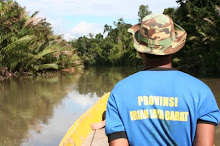Recent job adverts for an Estate Manager and an Assistant Estate Manager for PT Henrison Inti Persada (PT HIP) - a large oil palm plantation in West Papua Province - shine an illuminating light on what plantations involve on Indonesia’s half of the island of New Guinea - massive deforestation to produce “sustainable palm oil”.
The job adverts in question make clear the type of qualifications PT HIP is looking for in a successful candidate.
The Estate Manager applicant must have a university degree, and a "MINIMUM OF 6 YEARS EXPERIENCE IN JUNGLE CLEARING".
The Assistant Estate Manager needs a “minimum of 4 years experience as Assistant Manager in Jungle Clearing & Planting”.
Extensive “Jungle Clearing” experience is clearly an essential prerequisite to work for PT HIP, because they intend to utterly destroy tens of thousands of hectares of Papua’s valuable forests, while completely sidelining indigenous landowners.
“So who owns PT HIP?” I hear you ask.
The Kalia Agro Group, the Sutanto family, the Noble Group, and … Norway.
PT Henrison Inti Persada (PT HIP), which has a permit for 32,000 hectare oil palm plantation in Sorong, is one of three plantations companies set up under the Kalia Agro Group, a purpose vehicle plantations company owned by Michael Sutanto. Michael is a member of notorious Indonesian timber mafia clan - the Sutanto family, who have systematically (and often criminally) raped Indonesia’s forests for decades with complete impunity through the activities of their destructive and criminal Kayu Lapis Indonesia Group (KLI). (KLI owes over US$ 100 million to the Indonesian government, so it was a good idea to insulate the Sutanto family’s new oil palm venture from their logging debt liabilities.)
In June 2010 the plantation was effectively taken over by Hong Kong-based commodity traders the Noble Group, which purchased 51% of the shares in PT HIP. Norway’s Pension Fund has more than US$ 47 million of shares in the Noble Group, and so Norway will also profit from PT HIP’s planned jungle clearance in Papua. Analysts have estimated the plantation will be worth US$ 162 million once fully developed.
Not long after Noble Group took over the plantation, PT HIP applied for membership of the RSPO (Roundtable on Sustainable Palm Oil), presumably in a bid to green-wash their planned forest destruction and land expropriation in order to generate high value sales for the “sustainable biofuels” in Western markets. Perhaps Norway's finance ministry asked the Noble Group to seek RSPO status for PT HIP so that the oil rich country’s multi-million dollar plantations investments across Indonesia don’t look like they are trashing the forests it's environment ministry is supposed to be saving under it’s US$ 1 billion REDD+ agreement with Indonesia. Who knows?
"Jungle clearing" applicants are asked to apply to the Chief Operating Officer at PT HIP.
PT HIP’s RSPO application indicates that the company’s Chief Operating Officer is one Rajah CA Padman – a man who seems to have extensive jungle clearing experience himself.
BusinessWeek’s profile of Mr Padman indicates he has held numerous oil palm plantations management positions in Indonesia and Malaysia, principally at subsidiaries of United Plantations Bhd (UP), one of Malaysia’s leading palm oil groups.
During his extensive career with UP, Mr Padman co-authored an academic paper entitled “Experiences on the cultivation and management of oil palms on deep peat in United Plantations Berhad.”
The development of plantations on peatlands deeper than 3 metres is illegal in Indonesia, and avoiding peatland drainage for such plantations is one of the clear aims of Norway’s REDD deal with Indonesia. Strange then, that Norway also owns US$ 11 million of shares in UP, the plantations of which seem to have been fairly peaty, if Mr Padman’s paper is anything to go by.
In the application for RSPO membership for PT HIP, Mr Padman provided information on how the company would “comply with the RSPO Code of Conduct”. Mr Padman suggested that the company “intends to set up in house department with qualified and trained personnel to interpret the principles and criteria of RSPO”.
That PT HIP’s new job adverts for senior managers stipulate “a minimum of 4 years of Jungle Clearance” as basic qualification requirements clearly raises serious concerns that either PT HIP has no intention of being sustainable, or that the RSPO itself thinks extensive jungle clearance is just fine for sustainability.
Worse still, PT HIP’s application to the RSPO states that 22,000 hectares of the plantation will be “Inti”, or Core plantation owned and operated by the company, while 4,400 hectares will be “plasma” estates to be owned an managed by locals communities.
Yet Indonesian law stipulates that a minimum of 20% of any oil palm plantation must be plasma estates, and only 80% can be owned by the company itself. Clearly, PT HIP intends to manage more than 80% of the plantation, apparently in contravention of the law. At least 5,280 hectares of their overall operation area of 26,400 hectares should be plasma, according to the law.
But PT HIP does not always care much for the law. NGOs have reported that it began its operations before receiving its permits in 2006, and that its managers have been forcing children as young as four years old to sign land rental contracts.
If these types of things are compliant with the RSPO “code of conduct”, then the RSPO itself is utterly flawed. Lets wait and see if the company gets it’s RSPO membership, and then a certificate, before judging.
Thursday, 7 April 2011
Subscribe to:
Post Comments (Atom)




No comments:
Post a Comment